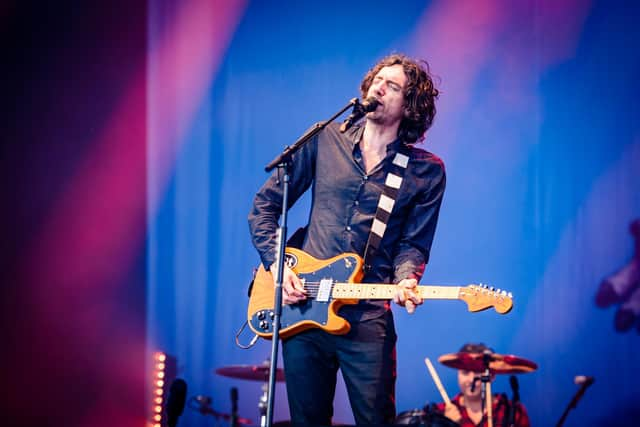New data reveals how central music scene is to NI economy
and live on Freeview channel 276
New data just released has demonstrated the economic importance of music to Northern Ireland.
Figures published ahead of Wednesday’s Music Cities event and the NI Music Prize show that, in 2019, the music sector in NI contributed almost £345 million to the economy and accounted for almost 6,500 jobs.
Advertisement
Hide AdAdvertisement
Hide AdDelving deeper, the direct music sector (comprising activities strictly within the commercial music sector) contributed £115 million in gross value (“GVA”) and 3,600 jobs, having almost doubled since the last economic study in 2013, when the figures were £61.5 million and 1,900 respectively.


Music creators (songwriters, musicians, performers and producers) and live music are the lifeblood of the NI musical ecosystem, altogether accounting for more than 75% of the sector’s overall GVA.
Music creators represent two thirds (2,189) of all those working directly in the sector, underlining the strength of the music scene’s overall contribution.
The study was commissioned by Fourth Pillar and supported by Northern Ireland Screen with funding provided by the Department for Communities, and the research was independently conducted by leading economists, Metro Dynamics.
Advertisement
Hide AdAdvertisement
Hide AdCommenting on the figures, Charlotte Dryden - CEO at the Oh Yeah Music Centre - said: “The publication of these figures represents an important step in educating policy makers on the vital role that music plays in supporting the NI economy. Music is more than a hobby or a ‘nice to have’; it provides jobs for thousands of employed and freelance staff across the region, from artist managers, record producers and music technology companies through to individuals working in talent development roles, as we do at Oh Yeah. Collectively, we are not just a rich community asset, but an economic keystone. At our Music Cities afternoon and the NI Music Prize, we will be celebrating all of those who work in our sector, including the behind-the-scenes champions of creativity and innovation.”
Snow Patrol’s Gary Lightbody added: “As the sector takes to the stage on Wednesday to celebrate the immense wealth of creative talent in Northern Ireland, this report acknowledges the invaluable contribution of professionals who work tirelessly to support musicians, creators and performers like myself. I’m excited by the potential and power that music has for our nation - it is there to uplift and connect communities, especially during challenging moments like these, but it is also there to provide jobs, support livelihoods and strengthen our economic credentials. We have the talent, we have the expertise, and we have the drive to succeed; now, we need the recognition and support of our political and business leaders to help us build on our success in the months and years ahead.”
In the context of the wider NI economy, in 2019 music was responsible for more direct employees (3,621) than the TV and Video Production and Programming and Broadcasting sectors combined (2,574). In the same year in Belfast, the first city in Ireland to be awarded the prestigious UNESCO City of Music title, music accounted for 1,781 jobs, with live music accounting for 81% of all music jobs in the capital, according to the global research firm, Sound Diplomacy.
Local recording studio owner and media entrepreneur, James Ayo, of Hotbox Entertainment, added: “This report matters because it shows strongly that working in music is a real profession. We have skills and knowledge that we have worked hard to develop; we have passion for using the power of music to grow the economy and support our communities; and we have a drive to develop the sector to retain talented young people to be our next generation of business leaders. Hotbox is committed to developing its business in Belfast, having recently expanded into a second studio, and we want to see the infrastructure that supports music talent continue to grow and strengthen right across the country.”
Advertisement
Hide AdAdvertisement
Hide AdPrior to the pandemic, concerts and festivals held in NI attracted over one million attendees each year, driving direct and indirect economic benefits across the region. In 2019, according to UK Music, 234,000 music tourists visited NI generating £81 million in tourist spend.
Beyond live music, an evolving and thriving infrastructure supports the development of creative talent, from recording studios, music managers and music retailers to music producers, music teachers and specialist lawyers and accountants. With NI now a popular filming location for broadcast content, the valuable opportunities for the production and use of music in entertainment media are growing. The business of music will be the primary focus for artists and music professionals at the popular Music Cities afternoon on Wednesday at the Oh Yeah Music Centre. Together with the local music sector, experts will explore the challenges and opportunities facing the business, from Web3 and digital rights management to the environment and NI’s night-time economy.
On behalf of the Arts Council of Northern Ireland (ACNI), Chief Executive Roisin McDonough, said: “There is no doubt that music is one of NI’s greatest strengths and these figures demonstrate the essential role it plays in supporting our economy. However, like so many sectors, music has been significantly impacted by the pandemic and the current cost of living crisis. Data recently released by ACNI shows that the arts sector as a whole faces additional costs of more than £12 million by the end of this financial year. We are working closely with the Department for Communities to drive forward the strategy for culture, arts and heritage - of which music is a core component - and to encourage greater cross-departmental working within Government with a view to protecting and nurturing this critical facet of our economy and identity.”
Sound of Belfast runs until November 20 and to view the full programme click here.